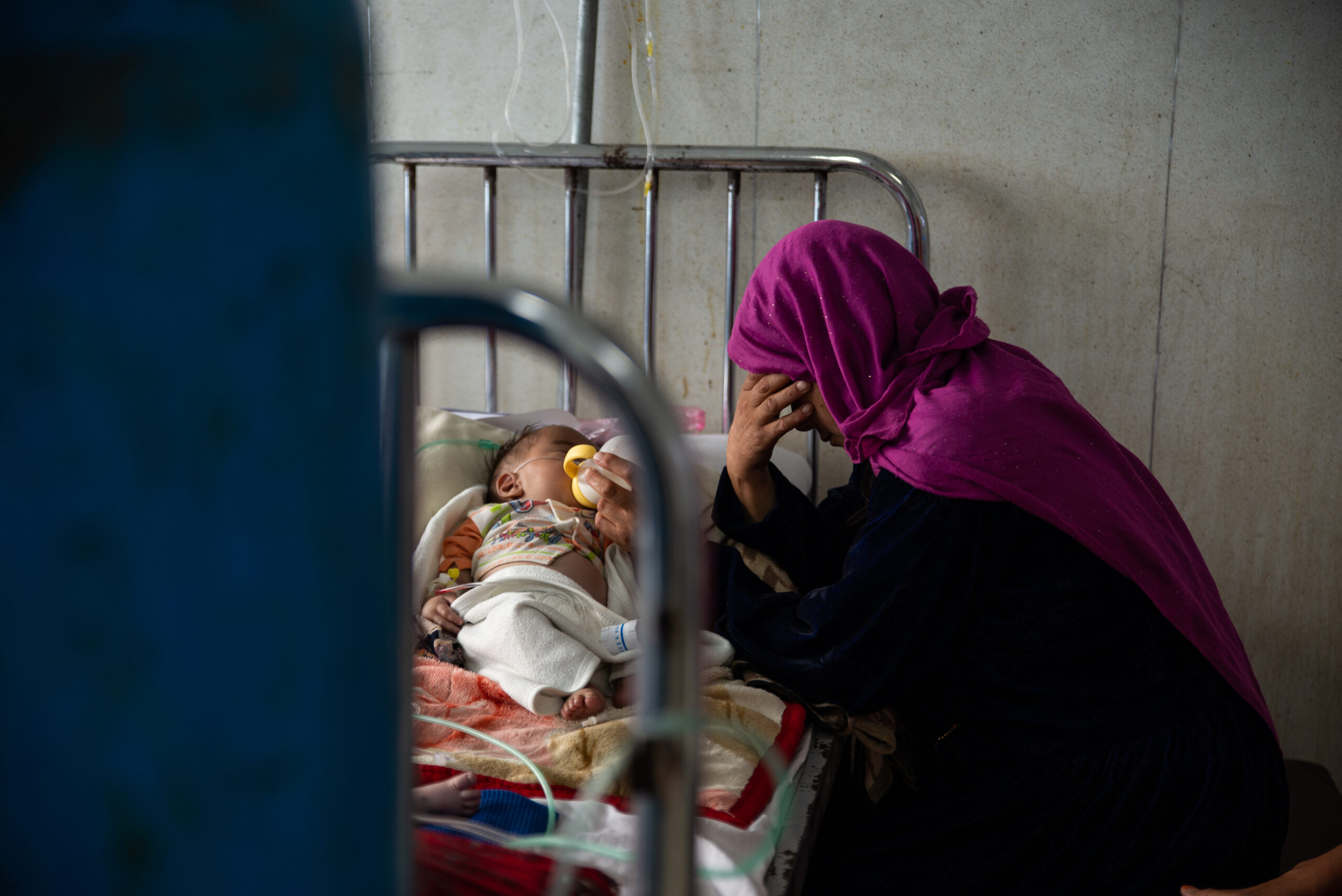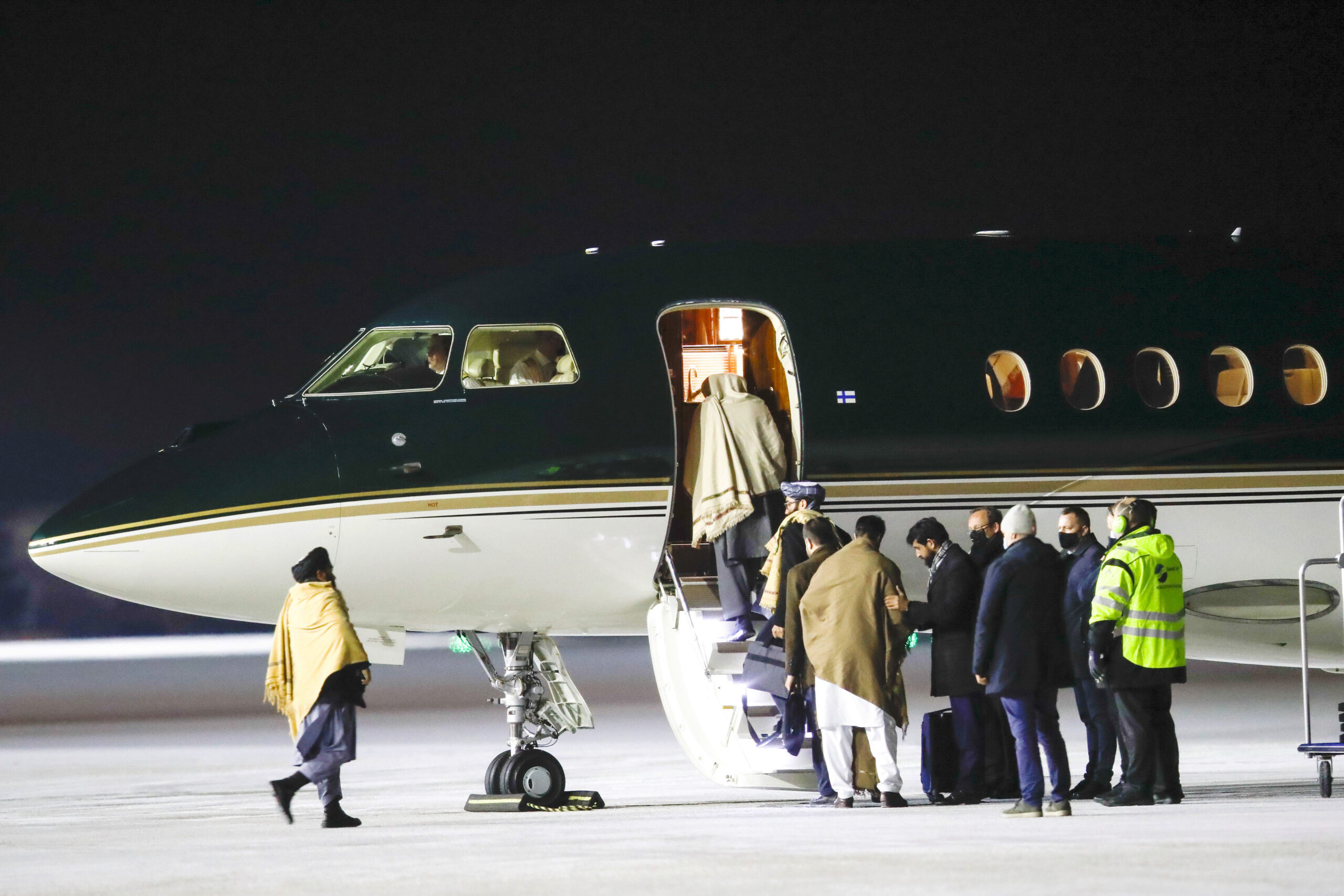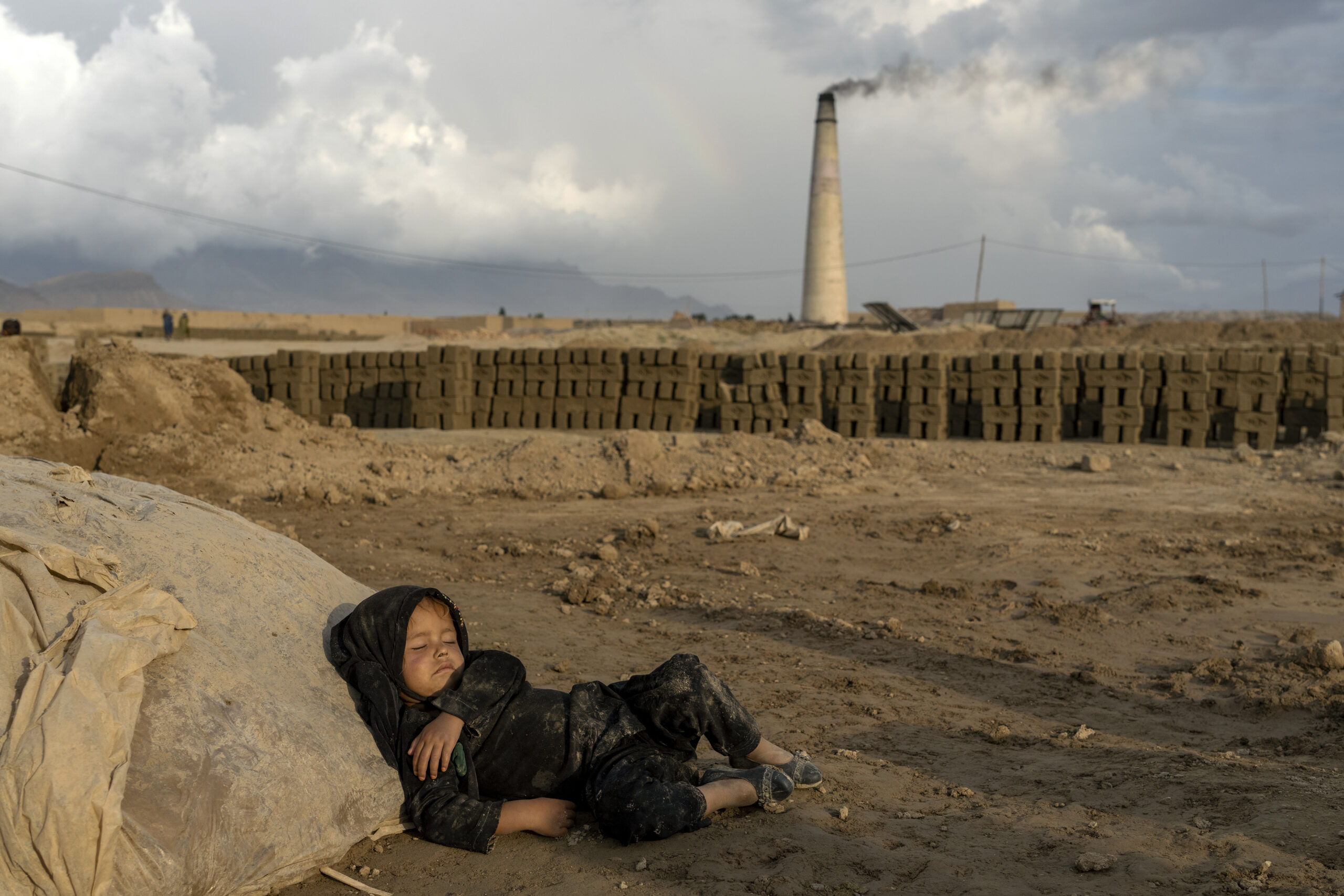Our policy recommendations
- The United States and the international community should coordinate usage of a wide range of tools – including targeted sanctions – to hold the Taliban accountable for their corruption, continued support for terrorist and extremist groups, and gross human rights abuses
- The United Nations and national governments should expand the definition of Apartheid to include gender-based discrimination and segregation to hold the Taliban accountable for their denial of the fundamental human rights of Afghan women
- The United Nations, international organizations, and national governments must remain firmly united against legitimizing the Taliban
- Governments, international organizations, and the philanthropic community should extend comprehensive support to Afghan civil society and elevate diverse Afghan voices within every forum related to Afghanistan’s future
The problem

A child receiving treatment for malnutrition is cared for at Indira Gandhi hospital on Aug. 13, 2022 in Kabul, Afghanistan. (Photo by Nava Jamshidi/Getty Images)
The Taliban attempt to style themselves as the best guarantors of Afghanistan’s security and stability, but their claims to have reduced violence, corruption, and drug trafficking are flimsy at best.
They openly celebrate harsh crackdowns on every facet of Afghan society and repeatedly undermine the fundamental human rights of women and girls. Reports by the United Nations and others document continued Taliban ties with terrorist groups. The regime takes no action against those who perpetrate violent attacks inside the country when they target a group the Taliban already oppose.
Too few countries directly challenge the Taliban’s false narratives because doing so necessitates holding the Taliban accountable. This complacency tests the international community’s resolve to withhold formal recognition of the Taliban. While consensus around nonrecognition has technically been upheld, in practice the Taliban eagerly pursue regional relationships and global opportunities in their quest for validation. Too many Individual countries, regional and international sporting bodies, international organizations, and businesses pursue or permit Taliban engagement in one form or another.
Equally concerning, a significant number of Taliban leaders are not currently subject to international or national sanctions. And frequent exemptions to travel bans on sanctioned Taliban leaders normalize their participation in high-level and highly visible convenings. Contradicting global consensus on nonrecognition, China, Kazakhstan, and the United Arab Emirates accepted the diplomatic credentials of Taliban-appointed representatives, while Iran, Oman, Pakistan, Turkmenistan, and Uzbekistan allowed the Taliban to take over the operation of Afghanistan’s embassies. And despite mounting concerns about the Taliban’s continued linkages with terrorist groups, Russia and Kazakhstan both delisted the Taliban as a terrorist organization to remove legal impediments to establishing deeper relations.

Representatives of the Taliban leave Gardermoen Airport after attending meetings at the Soria Moria Hotel in Oslo, Norway, Jan. 25, 2022. (Javad Parsa/NTB via AP)
The international community cannot continue to ignore the destabilizing impact of Taliban rule as the Afghan population suffers under the weight of their corruption, brutality, and extremism.
Although the international community’s leverage has changed since the withdrawal of international military forces from Afghanistan in 2021, accountability mechanisms exist and must be applied to signal that the Taliban’s barbaric rule of the country is not acceptable. Legitimizing the Taliban through deepening engagement, withholding enforcement of existing accountability mechanisms, and allowing the Taliban to set the agenda during international dialogues will weaken pressure on the Taliban to reform their brutal ways and ultimately undermine Afghanistan’s future prospects for peace and prosperity.
Our recommendations

A 4-year-old Afghan girl sleeps after work in a brick factory on the outskirts of Kabul, Afghanistan, Aug. 17, 2022. (AP Photo/Ebrahim Noroozi)
The United States and the international community should coordinate the use of a wide range of tools – including targeted sanctions – to hold the Taliban accountable for their corruption, continued support for terrorist and extremist groups, and gross human rights abuses
The United Nations Security Council and individual member states should fully comply with the existing travel ban and asset freeze measures in place against sanctioned Taliban leaders under the Resolution 1988 Committee. The Security Council should call for and publish a transparent review of member states that have provided insufficient detail or been late in submitting travel ban and asset freeze exemption requests. They should also review and update the list of Taliban members who merit designation to reflect leadership changes within the group and to apply greater pressure on those responsible for current abuses of power.
The United States and the 35 other countries that have adopted Global Magnitsky-style legislation should coordinate the application of this targeted sanctioning mechanism to impose their own visa bans and financial restrictions on specific Taliban leaders responsible for corruption, kleptocracy, and other human rights abuses.
The United States and other democratic governments should investigate the Taliban’s capture of Afghanistan government ministries, subnational entities, and enterprises and designate those individuals and industries that have become conduits for illegal activity, terrorist financing, corruption, and human rights abuses for targeted sanctions and as primary money laundering concerns under Section 311 of the USA Patriot Act.
The United Nations and national governments should expand the definition of Apartheid to include gender-based discrimination and segregation
The Sixth Committee of the United Nations General Assembly will meet in October 2024 to discuss a new Crimes Against Humanity Treaty and should revise the definition of Apartheid to account for the systematic persecution and marginalization of women in Afghanistan by the Taliban.
Expanding the definition of apartheid to recognize systematic gender persecution will create new accountability mechanisms and more accurately reflect the level of responsibility the international community should bear in pressuring the Taliban to respect the fundamental rights of women and girls in Afghanistan.
The United Nations, international organizations, and national governments must remain firmly united against recognizing the Taliban
The international community must make any invitations to the Taliban to participate in high-level convenings contingent upon steps toward restoring the fundamental human rights of all Afghans, especially women, girls, and other vulnerable populations. The Taliban have regularly abused the participation of their representatives at international gatherings as opportunities to advance propaganda that aims to legitimize their authority and deliberately misrepresent or soften positions taken by the international community. Inconsistent treatment of the Taliban by the international community enables their bid for power while also contributing to further repression and marginalization of the Afghan people.
Governments, international organizations, and the philanthropic community should extend comprehensive support to Afghan civil society and elevate diverse Afghan voices within every forum related to Afghanistan’s future
Afghanistan’s future security, peace, and prosperity will require meaningful participation from a diverse range of stakeholders reflective of the country’s population.
The international community must dedicate diplomatic and financial resources to ensure the survival, capacity, and visibility of Afghan civil society. Women, ethnic and religious minorities, civil society leaders, and members of the Afghan diaspora should be invited to participate at a high level in all international convenings that focus on Afghanistan’s future. The United States and other governments should consult regularly with a variety of representatives from Afghan civil society and identify opportunities to platform diverse voices in prominent ways.
Additionally, donors should prioritize support for organizations and initiatives that are led by and serve Afghan women and their families. They should also invest in supporting forums for dialogue where Afghan political and civic actors can discuss lessons learned and debate potential governance solutions.
Read the Bush Institute’s in-depth analysis and recommendations in the Captured State series:































